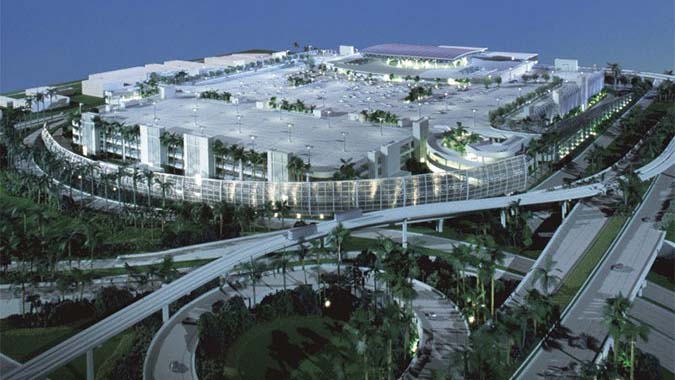photo credit: Florida Department of Transportation (FDOT) Miami-Dade Aviation Department (MDAD)
| Location |
Miami, Florida |
| Project Sponsor / Borrower |
Florida Department of Transportation (FDOT)
Miami-Dade Aviation Department (MDAD) |
| Program Areas |
   
|
| Mode |
Intermodal |
| Description |
The Miami Intermodal Center (MIC) comprised a multi-year program of ground access improvements to and within Miami International Airport (MIA). Major project elements include:
- Miami Central Station (MCS) - Intermodal center
for transit (Metrorail), commuter rail (Tri-Rail),
Amtrak, and intercity bus services
- Rental Car Center (RCC) - New rental car facility
consolidating rental car operations at the airport
and providing space for 10,000 cars
- MIA Mover - Automated airport people mover to
connect MIA to the MCS and RCC
- Various roadway improvements to improve airport
access
|
| Cost |
$2,030 million |
| Funding Sources |
Federal
- Federal funding (grants) - $6 million
- TIFIA loan - $270 million (capitalized interest - $42 million)
State
- State Transportation Trust Fund (STTF) loan - $245 million
- Florida SIB Loan - $70 million
- Other state funding (grants) - $975 million
Local
- MDAD - $140 million
- Miami-Dade Expressway Authority (toll revenue) - $86 million
- Dedicated and ancillary revenues (customer facility charges, rent, and lease revenue) - $141 million
|
| Project Delivery / Contract Method |
Construction Manager/General Contractor (CM/GC) |
| Private Partner |
None |
| Project Advisors / Consultants |
AECOM (Construction Manager) and 82 subconsultants
To USDOT TIFIA JPO
- TIFIA Legal Advisor - Nixon Peabody
- TIFIA Financial Advisor - Montague DeRose
|
| Lenders |
Bondholders, USDOT TIFIA |
| Duration / Status |
- Roadway improvements - Construction began in June 2003; completed in May 2008.
- RCC - Construction began in July 2007; opened on July 13, 2010.
- MIA Mover - Construction began fall 2009; operational on September 9, 2011.
- Miami Central Station - Notice to Proceed received on May 18, 2011; opened in April 2015. (While a major project this segment was not funded with TIFIA proceeds.)
|
| TIFIA Credit Assistance |
The original TIFIA commitment amounted to up to $539
million, comprised of two separate obligations:
- The FDOT Program Elements loan - $269 million;
to be repaid from fuel tax revenues.
- Rental Car Center loan - up to $170 million, amended to $270 million to be repaid from fees levied on rental car users.
- The FDOT Program Elements loan closed on June
9, 2000 and was repaid in full on July 3, 2006. The
Rental Car Facility loan closed on April 29, 2005
and was amended on August 1, 2007.
|
| Financial Status / Financial Performance |
TIFIA credit agreements
June 9, 2000 (Roadway improvements) and on April 29, 2005 (RCC)
The first TIFIA loan was for $269 million and was prepaid by FDOT on July 3, 2006 in the amount of $17.1 million including interest, 24 years ahead of the originally scheduled maturity date. Of the $269 million, only $15 million was withdrawn because FDOT replaced it with a more competitive internal loan through the STTF. The second TIFIA loan in the amount of $170 million was approved for the RCC. An additional $100 million was requested and approved in August 2007, bringing the total for the second loan to $270 million.
The second TIFIA loan in the amount of $170 million was approved for the RCC. An additional $100 million was requested and approved in August 2007, bringing the total for the second loan to $270 million. |
| Innovations |
- Use of the Construction Management at Risk (CM) project delivery method that provided the opportunity to begin construction prior to design completion, centralize risk and responsibility under one contract, and guarantee completion of the project at a negotiated price. The CM was compensated in the pre-construction phase by a negotiated fixed fee. After the award of Guaranteed Maximum Price (GMP) construction contracts, the CM managed a fast-track construction program and construction starts before all design is complete. The CM was required to pre-qualify all subcontractors with all trade contracts being competitively bid. Consequently, all construction work was competitively procured.
- A Joint Development program has been established for the MIC to capture the economic development potential in the area and enhance the functionality of the MIC by encouraging public transit use.
|
| Related Links / Articles |
MIC Website |
| Contacts |
MIC Public Affairs Program
Ric Katz, Manager
Tel: (305) 573-4455
rkatz@communikatz.com |
